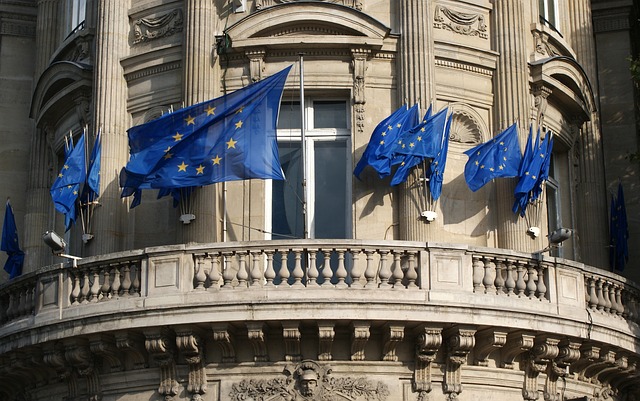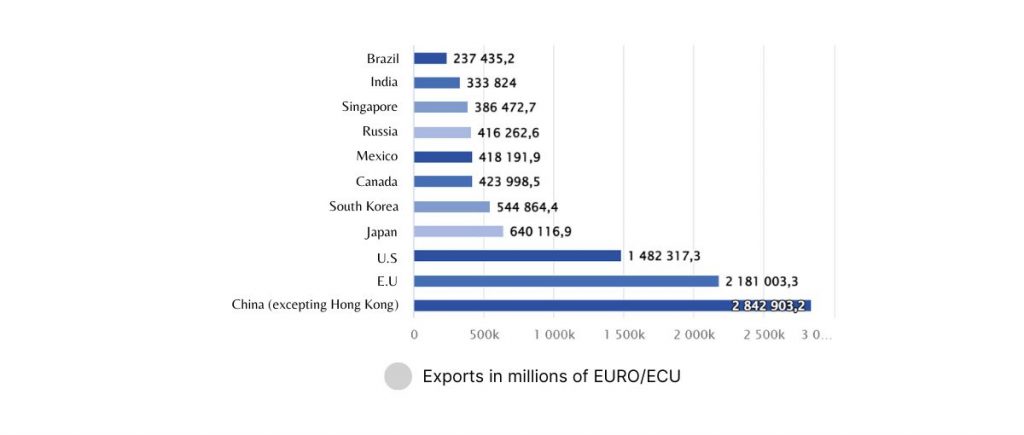
March 21, 2023
The European Union is the largest single market in the world. In 2021, the EU’s GDP was €14 522 billion.
The European Union is made up of 27 countries: Belgium, Denmark, Germany, Spain, Portugal, Italy, France, Ireland, Bulgaria, Latvia, Luxembourg, the Netherlands, Croatia, Sweden, Slovakia, Greece, Malta, Finland, Poland, the Czech Republic, Austria, Estonia, Slovenia, Hungary, Lithuania, Cyprus and Romania. Each joined at a different point in their history, but all share certain advantages.
Advantages of trading in the European Union
The European Union is a Customs Union, so in terms of trade it functions as a single territory. The main advantages of this are:
♦ No tariff barriers between EU countries, which means free movement of goods and capital throughout the territory.
♦ A common external trade policy
♦ Free movement of people
♦ Trade agreements with other territories which will be explained later.
In addition, the European Union is the largest single market in the world. In 2021, the EU’s GDP was €14 522 billion.
The EU accounts for around 14% of world merchandise trade, being the world’s second largest player in international trade.

EU trade agreements with other territories
The European Union has multiple trade agreements with various territories. One of them is the Comprehensive Economic and Trade Agreement (CETA)
Comprehensive Economic and Trade Agreement (CETA)
CETA is a trade agreement between the EU and Canada. This agreement facilitates the export of goods and services between Canada and the EU:
→ It eliminates customs duties between the EU and Canada (99% of the customs tariffs between Canada and the EU are eliminated),
→ Makes it easier for companies from both sides to compete with each other’s public procurement,
→ Makes it easier for professionals from both sides to switch from one market to the other, allows mutual recognition of qualifications,
→ Facilitates cross-border investments between the two markets.
CETA provisionally entered into force on 21 September 2017, it still needs to be ratified by all EU member states to take full effect, which some countries have already done, including: Denmark, Estonia, Spain, Croatia, Czech Republic, Latvia, Lithuania, Luxembourg, Malta, Austria, Portugal, Romania, Slovakia, Finland and Sweden. However, since the provisional entry into force, most of the agreement applies.
As for which parts of the agreement currently apply, taxes are the first barrier to disappear. Most customs duties were eliminated with the provisional entry into force of CETA, the rest are gradually disappearing until 2024, when all customs duties on industrial goods will disappear.
Currently, the trade situation between Canada and the EU is very positive, as the Delegation of the European Union to Canada shows: in 2021, EU-Canada trade in goods reached €60.7 billion. It means an increase of 31% compared to before CETA entered into force.
Other European Union Trade Agreements
In addition to CETA, the European Union has multiple trade agreements with other countries such as Indonesia, Australia, New Zealand, UK or India. It is important to be aware of the status of the agreements, as some are in force, others are pending ratification or under negotiation.
Getting into the European market
If you export a product to an EU country, you can trade it throughout the 27 EU countries without tariff barriers (although you should check if your product complies the specific conditions of the legislation of the country you want to enter). However, if you want to get into the EU market in a long-term basis, the best way to do it is internationalizing your company to one of your key EU target countries.
At ALTIOS we can help you to get into the European Market, studing the best countries and strategies to make your company grow internationaly. We are an international consultancy with more than 30 years of experience and presence in 22 countries. One of our biggest markets is the European Union. If you want us to help your company to enter it or to take advantage of one of the trade agreements that the EU has with other markets, please contact us. If you want more information, you can also check our services. If you are placed in Spain, you can contact our office in Madrid directly through m.moreno@altios.com .


